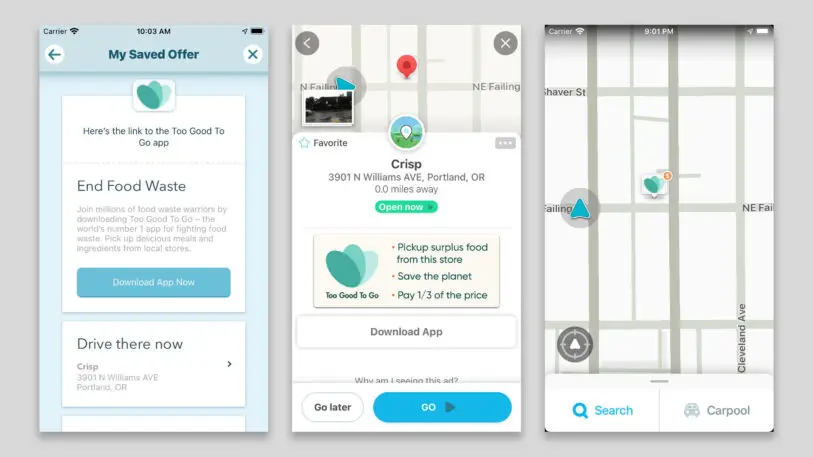More than 140 million people use the Waze app, the Google-owned GPS navigation tool for drivers, in order to avoid traffic and find the most stress-free ways to get around. Now, with a new partnership, the company hopes it can navigate that substantial user base to economical food options during their journeys, and help decrease food waste at the same time.
Waze has rolled out a new campaign with Too Good To Go, an app that allows people to buy surplus food items that would otherwise be discarded at discounted rates. The winner of this year’s World Changing Ideas award in the Apps category, Too Good To Go enables eateries to pack and sell “surprise bags” of food, either prepared meals or raw ingredients, usually at a third of the retail price. People can log into the app and reserve and pay for a bag of goods to pick up at a later scheduled time.

With Waze, that process becomes easier for commuters. Waze users are already used to seeing “pins” on their maps, which notify them of nuisances such as construction, road closures, and speed traps ahead on their routes. There are also some branded pins: “digital billboards” whereby companies can advertise their locations for drivers. Waze users will now be able to see Too Good To Go pins, displaying stores and restaurants that are giving out their leftover goods. For instance, they might see that there are treats available from La Colombe Coffee Roasters, Just Salad, Juice Press, or Auntie Annie’s. Through Waze, they’ll be able to download the Too Good To Go app, reserve a spot, and pick up the food after work—of course, using Waze to get there.
Pilecki says Waze is an especially compatible partner, because the entire basis of its operation already relies on its user community, who send in “enriched information” about traffic, which informs the real-time mapping. “Our community is really big on giving back and helping each other,” he says. After piloting charitable initiatives in past years, the company formalized its impact initiatives into Waze For Good at the end of 2020, which kicked off with the addition of 74,000 food banks around the world to its maps.
For Too Good To Go, the ultimate goal is to reduce food waste, which also may be an effective way to combat climate change; food waste may contribute as much as 10% of the world’s greenhouse gas emissions. It’s estimated that every kilogram of food waste emits 2.5 kg of carbon dioxide—equivalent to charging your smartphone 422 times.
The Too Good To Go pins will be visible on Waze until September 10 in New York, Washington, D.C., Philadelphia, Portland, and Seattle, though the plan is to evaluate the trial and expand it at a later date. Pilecki says the environmental goal is compatible with Waze’s main priority as a business: to reduce traffic for the average driver, who sits in 40 hours of congestion a year. “Anytime you’re in your car,” he says, “if we can save you a couple minutes—and save some emissions along the way—we’re extremely excited about that.”
Correction: We’ve updated this article to reflect the correct number of Waze users: It’s 140 million, not 30 million.
Recognize your brand’s excellence by applying to this year’s Brands That Matter Awards before the early-rate deadline, May 3.
